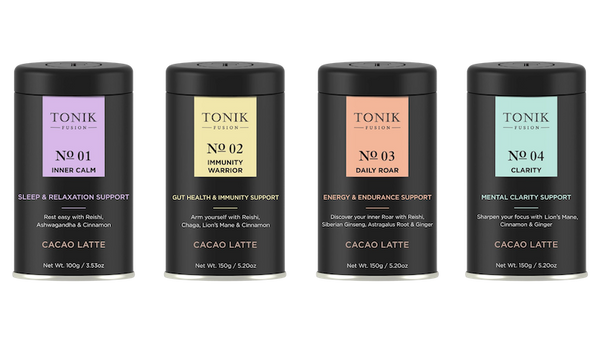Is Reishi An Anti Bacterial? | Antimicrobial & Antifungal Benefits
Before launching Tonik Fusion, my intrigue with functional mushrooms stemmed from a keen interest in their untapped health potentials. Diving into academic research and scientific papers, I was particularly struck by the antibacterial and antimicrobial capabilities of Reishi mushrooms.
Each study I encountered expanded my understanding and appreciation for these natural wonders, revealing a world of health benefits that went far beyond common knowledge.
Reishi mushroom is recognized for its antibacterial properties alongside its antifungal and antimicrobial effects, contributing to its role in immune boosting and infection prevention. Scientific studies have begun to shed light on the bioactive compounds within Reishi that lend to its use as a natural antibacterial agent, supporting its traditional use in holistic health practices.
Why Is Reishi Mushroom Effective?

Reishi mushrooms have been a cornerstone in traditional medicine for centuries, revered for their ability to enhance wellness and longevity. Their broad spectrum of health benefits, from immune support to stress relief, positions them as a fascinating subject for modern scientific exploration.
Is Reishi Mushroom an Effective Antibacterial Agent?
Recent scientific studies are increasingly validating the long-held beliefs in traditional medicine about Reishi mushrooms' significant antibacterial properties. This body of research highlights the active compounds within Reishi, such as polysaccharides and triterpenoids, that contribute to its ability to inhibit bacterial growth effectively.
These discoveries not only reinforce the credibility of ancient herbal practices but also suggest that Reishi mushrooms could play a valuable role in contemporary strategies for preventing and treating bacterial infections, offering a natural complement to conventional antibiotics and opening new avenues in the quest for holistic health solutions.
How Do Reishi Mushrooms Combat Bacteria?

The effectiveness of Reishi mushrooms against bacteria is underpinned by its diverse range of bioactive components, which together form a potent antimicrobial defense mechanism.
Beyond polysaccharides and triterpenes, Reishi also contains beta-glucans and peptidoglycans, compounds known for their immune-modulating effects.
This intricate combination not only targets and suppresses harmful bacteria but also strengthens the body's own defenses, illustrating the depth of Reishi's capabilities in supporting health and warding off infection.
This multifaceted approach highlights the mushroom's adaptability and its potential as a comprehensive support against microbial threats.
Comparing Reishi to Traditional Antibacterial Solutions
While not a replacement for conventional antibiotics, Reishi offers a complementary approach with its natural antibacterial capabilities. Its holistic benefits extend beyond infection control, supporting overall health and well-being.
Are There Any Side Effects to Using Reishi Mushroom as an Antibacterial?
Reishi is generally well-tolerated, but like any supplement, it's crucial to adhere to recommended dosages. Starting with a product like our Tonik Fusion blends ensures a balanced intake, minimizing the risk of adverse effects.
How to Incorporate Reishi Mushroom into Your Health Routine
Incorporating the holistic benefits of Reishi into your daily wellness routine is effortlessly achieved through our specially crafted cacao latte blends at Tonik Fusion.
Our 'Inner Calm' blend combines Reishi with Ashwagandha to ease the mind and promote relaxation, while 'Immunity Warrior' enhances Reishi's immune-boosting properties with the added support of Lion's Mane and Chaga for comprehensive systemwide protection.
Not to be overlooked, the 'Daily Roar' blend taps into Reishi's adaptogenic power to support endurance and vitality, complemented by Siberian Ginseng and Astragalus for an energizing boost.

Each blend is thoughtfully formulated to not only deliver the therapeutic benefits of Reishi but also to synergize with other adaptogens, enhancing your health and well-being with every sip. You can check out our shop here.
FAQ’s About Reishi Mushroom's Antibacterial Properties
Does Reishi Mushroom Have Antibacterial Properties?
Yes, scientific studies affirm the presence of antibacterial properties in Reishi, highlighting its role in combating bacterial growth.
Is Reishi an Antifungal?
Yes, Reishi also exhibits antifungal properties, contributing to its multifaceted role in supporting the body's defense mechanisms against various pathogens.
Can Reishi Fight Bacterial Infections?
Reishi supports the body's natural defenses against infections, making it a valuable ally in overall infection management, though not a replacement for medical treatments.
How Does Reishi Compare to Conventional Antibiotics?
While Reishi possesses antibacterial properties, it operates differently from conventional antibiotics and is best used as a supplementary approach to health rather than a direct substitute.
Is It Safe to Consume Reishi Mushroom Daily?
Yes, Reishi is generally safe for daily consumption within recommended dosages, making it a practical addition to a regular health and wellness regimen.
Can Reishi Be Combined With Other Medicinal Mushrooms for Enhanced Benefits?
Absolutely, Reishi pairs well with other medicinal mushrooms like Lion's Mane and Chaga, each adding unique benefits to support holistic health.
Wrap Up

Reishi mushroom stands as a testament to the power of nature's pharmacy, offering antibacterial, antifungal, and antimicrobial benefits that align with its revered status in traditional medicine.
As we continue to explore the depths of adaptogenic mushrooms at Tonik Fusion, we invite you to discover the holistic benefits of Reishi through our carefully crafted cacao latte blends.
Visit our shop to find the perfect blend for your lifestyle and wellness goals, and take our quiz to find the best way to get started on your journey with the healing power of Reishi.
Disclaimer: The information provided in this article should not be used as a substitute for professional medical advice, diagnosis, or treatment. The statements contained herein have not been evaluated by the Food and Drug Administration (FDA). Before adding Reishi to your health and wellness routine, talk to a health care professional about the potential benefits, side effects, and uses of this mushroom.